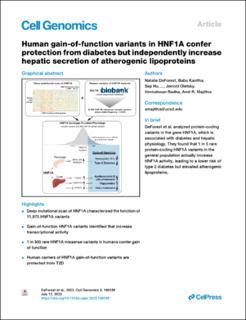| dc.contributor.author | DeForest, Natalie | |
| dc.contributor.author | Kavitha, Babu | |
| dc.contributor.author | Hu, Siqi | |
| dc.contributor.author | Isaac, Roi | |
| dc.contributor.author | Krohn, Lynne | |
| dc.contributor.author | Wang, Minxian | |
| dc.contributor.author | Du, Xiaomi | |
| dc.contributor.author | De Arruda Saldanha, Camila | |
| dc.contributor.author | Gylys, Jenny | |
| dc.contributor.author | Merli, Edoardo | |
| dc.contributor.author | Abagyan, Ruben | |
| dc.contributor.author | Najmi, Laeya Abdoli | |
| dc.contributor.author | Mohan, Viswanathan | |
| dc.contributor.author | Flannick, Jason | |
| dc.contributor.author | Peloso, Gina M. | |
| dc.contributor.author | Gordts, Philip L.S.M. | |
| dc.contributor.author | Heinz, Sven | |
| dc.contributor.author | Deaton, Aimee M. | |
| dc.contributor.author | Khera, Amit V. | |
| dc.contributor.author | Olefsky, Jerrold | |
| dc.contributor.author | Radha, Venkatesan | |
| dc.contributor.author | Majithia, Amit R. | |
| dc.date.accessioned | 2023-09-22T12:32:48Z | |
| dc.date.available | 2023-09-22T12:32:48Z | |
| dc.date.created | 2023-09-19T10:25:44Z | |
| dc.date.issued | 2023 | |
| dc.identifier.issn | 2666-979X | |
| dc.identifier.uri | https://hdl.handle.net/11250/3091399 | |
| dc.description.abstract | Loss-of-function mutations in hepatocyte nuclear factor 1A (HNF1A) are known to cause rare forms of diabetes and alter hepatic physiology through unclear mechanisms. In the general population, 1:100 individuals carry a rare, protein-coding HNF1A variant, most of unknown functional consequence. To characterize the full allelic series, we performed deep mutational scanning of 11,970 protein-coding HNF1A variants in human hepatocytes and clinical correlation with 553,246 exome-sequenced individuals. Surprisingly, we found that ∼1:5 rare protein-coding HNF1A variants in the general population cause molecular gain of function (GOF), increasing the transcriptional activity of HNF1A by up to 50% and conferring protection from type 2 diabetes (odds ratio [OR] = 0.77, p = 0.007). Increased hepatic expression of HNF1A promoted a pro-atherogenic serum profile mediated in part by enhanced transcription of risk genes including ANGPTL3 and PCSK9. In summary, ∼1:300 individuals carry a GOF variant in HNF1A that protects carriers from diabetes but enhances hepatic secretion of atherogenic lipoproteins. | en_US |
| dc.language.iso | eng | en_US |
| dc.publisher | Cell Press | en_US |
| dc.rights | Attribution-NonCommercial-NoDerivatives 4.0 Internasjonal | * |
| dc.rights.uri | http://creativecommons.org/licenses/by-nc-nd/4.0/deed.no | * |
| dc.title | Human gain-of-function variants in HNF1A confer protection from diabetes but independently increase hepatic secretion of atherogenic lipoproteins | en_US |
| dc.type | Journal article | en_US |
| dc.type | Peer reviewed | en_US |
| dc.description.version | publishedVersion | en_US |
| dc.rights.holder | Copyright 2023 The Author(s) | en_US |
| dc.source.articlenumber | 100339 | en_US |
| cristin.ispublished | true | |
| cristin.fulltext | original | |
| cristin.qualitycode | 1 | |
| dc.identifier.doi | 10.1016/j.xgen.2023.100339 | |
| dc.identifier.cristin | 2176383 | |
| dc.source.journal | Cell Genomics | en_US |
| dc.identifier.citation | Cell Genomics. 2023, 3 (7), 100339. | en_US |
| dc.source.volume | 3 | en_US |
| dc.source.issue | 7 | en_US |

